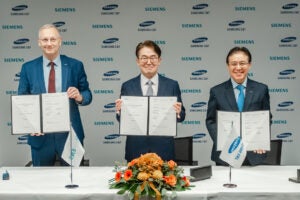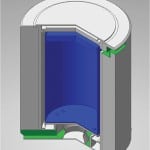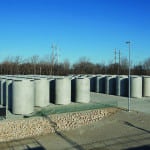Three U.S. senators on Tuesday introduced a trio of bills to improve the safety and security of decommissioning reactors and the storage of spent nuclear fuel ahead of Wednesday’s full Senate committee hearing on nuclear reactor decommissioning.
The three bills were introduced by Sens. Barbara Boxer (D-Calif.), chair of the Senate Committee on Environment and Public Works (EPW), Bernie Sanders (I-Vt.), and Edward Markey (D-Mass.).
The Safe and Secure Decommissioning Act of 2014 would prohibit the Nuclear Regulatory Commission (NRC) from issuing exemptions from its emergency response or security requirements for spent fuel stored at nuclear reactors that have permanently shut down until all spent fuel stored has been moved into dry casks. The Nuclear Plant Decommissioning Act of 2014 seeks to ensure that states and local communities play significant roles in crafting decommissioning plans for retired plants and requires the NRC to “transparently” vet every proposed decommissioning plan. Finally, the Dry Cask Storage Act of 2014 seeks to ensure every nuclear reactor operator will comply with an NRC-approved plan for the removal of spent fuel from pools and into dry cask storage within seven years of the time the plan is submitted to the NRC. That bill also provides funding to help reactor licensees implement the plans and expand emergency planning zones for non-compliant reactor operators to 50 miles.
The Risks at Shuttered Plants
At the hearing before the full EPW committee on Wednesday to assess “stakeholder” views, Sen. Boxer said the bills were necessary because some decommissioned nuclear plants across the nation were located on or near earthquake faults and many stored spent fuel over capacity.
The spent fuel pools at the retired San Onofre Nuclear Station (SONGS) in San Clemente, Calif., for example are designed to hold 1,600 fuel rod assemblies but currently hold more than 2,600. Vermont Yankee, scheduled to permanently close later this year, has about 3,879 fuel rod assemblies in a spent fuel pool designed to hold about 350. “That overcrowding puts them at risk of serious safety consequences of an accident or terror attacks,” Boxer said. “NRC has taken no action thus far to ensure appropriate levels of protection are in place. Fact: Every time operators of decommissioning reactors have asked to be exempted from NRC’s emergency response regulations … they’ve said ‘yes.'”
But since 1982, the NRC has overseen the successful completion of decommissioning at 11 nuclear power plants, Michael Weber, the NRC’s Deputy Executive Director for Materials, Waste, Research, Tribal, and Compliance Programs, told lawmakers at the hearing. Each has been completed in a “safe and effective manner that supported termination of the license and release of the sites for other uses,” with the exception of portions of the site devoted to onsite storage of spent nuclear fuel, he said. While the NRC believes its regulatory program adequately “protects public health and safety, we continually assess the lessons learned from our decommissioning processes to identify appropriate program improvements,” he added.
Seventeen other reactors are in some stage of decommissioning, he noted, 10 that are using or transitioning to the SAFSTOR (safe storage) option, four that are using the DECON (decontamination) option, and two that have not yet chosen a decommissioning option. These include plants that shut down over the past year before their licenses expired: Kewaunee in Carlton, Wis.; Crystal River Unit 3 in Crystal River, Fla.; and SONGS Units 2 and 3 in California. Operators of the Vermont Yankee Nuclear Power Station have also announced that they intend to permanently shut down the plant at the end of 2014. Between 2014 and 2050, meanwhile, nearly all the current fleet of U.S. reactors is slated for retirements unless there is another round of 20-year extensions.
Vermont: NRC Shuns State Involvement in Decommissioning Process
City of Del Mar Council Member Donald Mosier told the committee that the shutdown of SONGS Units 2 and 3 was “viewed a victory” for the City of Del Mar, as well as for nearby Los Angeles and San Diego, but “that declaration of victory was premature since we now realize that storage and disposal of the radioactive waste at SONGS during the decommissioning process has numerous challenges.” SONGS is a “terrible site for a semi-permanent nuclear waste repository projected to last for 60 years or more,” he said. “The Department of Energy needs to use funds collected from ratepayers” to determine when fuel assemblies can be moved to dry cask storage and when those casks can be transported to waste repositories.
Christopher Recchia, a commissioner of the Vermont Public Service Department, the state body that was bitterly opposed the NRC’s 20-year license renewal for Entergy’s Vermont Yankee, told lawmakers that the NRC “has demonstrated it prefers not to address, let alone resolve, issues of concern to states or local communities.” Legislation is therefore a “critical and so logical a step,” he said.
“The current statutory and regulatory system is outdated. It is a system that might have made sense when nuclear plants were solely owned by utilities, since a state’s inherent authority over utilities and rate regulation would have given states a strong role in post-closure decisions. With the switch to merchant generators, states have been left without a say and without a federal agency willing to take its regulatory role into the 21st century in an open and responsive way.”
Of particular concern is that the “NRC has not shown a willingness to address spent fuel management in a manner that is responsive to states’ interest,” Recchia added. “Since the states are required to continue to house the nuclear plant and its wastes until current problems are resolved—which is not foreseeable—states must be allowed to play a full and effective role in the post-shutdown process. Without the legislation, the states are left with a problem they did not create and with imposed circumstances they cannot influence.”
NEI: Decommissioning Process Is Sound
But according to Marvin Fertel, president and CEO of the Nuclear Energy Institute (NEI), the industry group whose 370 members include all U.S. companies licensed to operate commercial reactors, the NRC’s record of decommissioning more than 70 test and power reactors since the 1960s shows that the agency’s process is strong and flexible. It also provides ample opportunities for interaction from states, local communities, and tribes—allowing the public to attend meetings, provide comments, and have access to plant-specific decommissioning information, Fertel told the lawmakers.
Of perhaps more significance should be concerns that reactor operators may not have adequate funds for decommissioning of facilities, but even here “the NRC’s regulatory framework has been proven effective by the fact that every power reactor that has shut down, and has been or is currently being decommissioned has been able to fund and safely perform required decommissioning activities,” he said.
In a December 2012 report, “the NRC found that 100 of the then-104 reactors provided the full amount of decommissioning funding assurance, and the remaining four had provided information to resolve their decommissioning funding shortfalls,” he said.
—Sonal Patel, associate editor (@POWERmagazine, @sonalcpatel)









